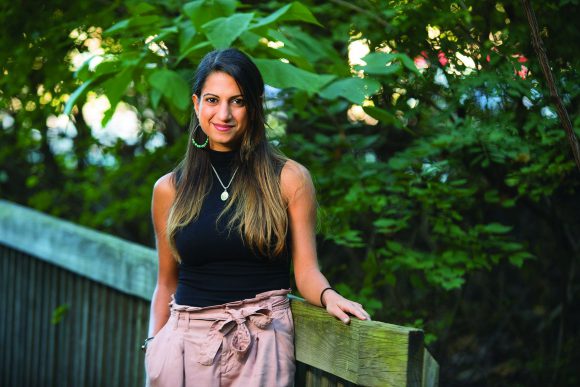
Alumnus Ariana Tsiattalos (SEBS’12). Photo: John O’Boyle.
In this continuing series, Explorations, the bi-annual magazine of the School of Environmental and Biological Sciences, profiles recent graduates who have launched successful careers and are making an impact on society. The editors posed a series of questions about how their Rutgers experience influenced their lives. Here is one such profile that appears in the Fall 2017 issue.
Ariana Tsiattalos (SEBS’12, Ecology, Evolution and Natural Resources)
After receiving her bachelor’s degree, Ariana Tsiattalos earned a master-of-science degree in conservation and biodiversity from the University of Exeter in the UK. She is an environmental specialist and wetland scientist with the New Jersey Department of Environmental Protection, managing environmental assessments of proposed development projects within freshwater wetlands, riparian zones, flood hazard areas, and other environmentally sensitive areas.
Q: How have your experiences and personal contacts from your days at Rutgers contributed to your success in your career?
A: As an early academic, I was in awe of the breadth of expertise and accomplishmentsof my science professors, which motivated me to begin carving a path under a mentor’s guidance. I joined Dr. Rebecca Jordan’s research lab to contribute to the study of behavior in Lake Malawi cichlids. Pursuing applied research so early enhanced my ability to think critically and creatively on how to best implement the scientific method.
Q: Does a pivotal, “ah-ha” moment come to mind when you look back on your time at Rutgers, as far as getting to where you are now?
A: It was during a course entitled “Conservation Ecology” taught by Dr. David Ehrenfeld. While learning about various biological and social elements that underpin many major global environmental challenges, I realized for the first time that effective conservation inherently requires an ability to understand the multi-faceted interactions of novel problems to fairly critique proposed solutions. Today, this integrated framework has enhanced my capacity to engage in discussions about complex issues, communicate science in an inclusive, informed, and progressive manner, and assert evidence-based action.
Q: What memories of college do you hold dear?
A: I used to love laying on my blanket by Passion Puddle on the Cook Campus in between classes to catch up on homework or take a nap—it was a wonderful way to feel productive while actively engaging in campus life—and amazing hikes with the Rutgers Outdoors Club. I am most grateful for the intellectual energy and limitless opportunities that were so easily accessible. It always seemed like there was everything and anything happening either nearby or a shuttle bus away.
Q:What is your favorite motivational quote?
A: “Never doubt that a small group of thoughtful, committed citizens can change the world. Indeed, it is the only thing that ever has.” – Margaret Mead
Q: What is your next step?
A: My “next step” is always to involve myself in as many platforms as possible to call for evidence-based action on developing practical, non-zero sum solutions to the most pressing environmental issues of our time. I joined the Union of Concerned Scientists (UCS) Science Network to continue discussing climate impacts in New Jersey and advocating for relevant solutions by organizing lobby days with my elected representatives and holding meetings with local community members. It’s a true honor to be recently featured on the UCS’s Science Network Spotlight website.
Q: What gives you the most pride about being a Rutgers graduate?
A: I am most proud that we are recognized as a top public research university. It is crucialnow more than ever that we protect funding for research and continue leading innovation; this direction is imperative in the development and cultivation of the future leaders of our world

